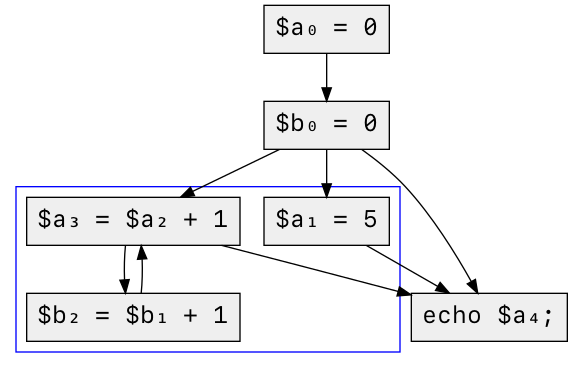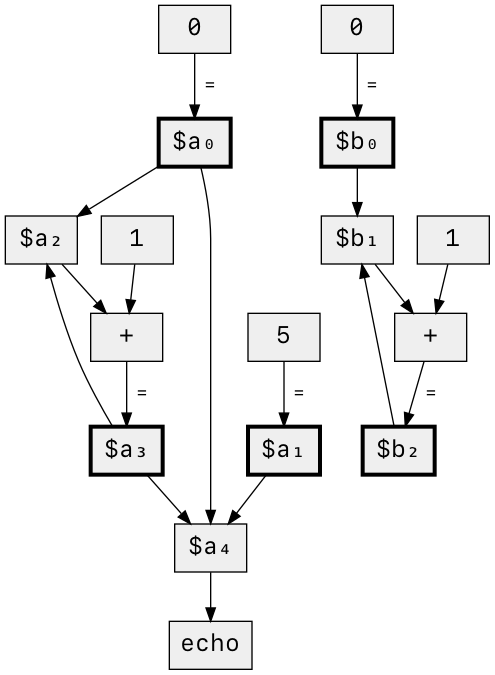Better Unused Variable Detection in Psalm 4
This is part of a series of articles about the new features of Psalm 4.
The new version of Psalm comes with massively-improved unused variable detection. To understand why the new system is better, we're going to get a bit theoretical.
The status quo
Psalm added unused variable detection three years ago, modelled on the unused variable detection used by PhpStorm & TypeScript. It was a basic mark-and-sweep system: for any given assignment to a variable, is that assignment used anywhere?
Consider this dummy code:
function foo() : void {
$b = $a = 0;
while (first_condition()) {
if (second_condition() && third_condition()) {
$a = 5;
break;
}
if (fourth_condition()) {
continue;
}
$a = $a + 1;
$b = $b + 1;
}
echo $a;
}
Looking at the above we can see that all assignments to $a inform the value passed to echo, but the same is not true of $b – its value is used on the right-hand-side of $b = $b + 1, but that assignment doesn't end up anywhere useful. This useless usage is enough to satisfy the mark-and-sweep approach (which thus marks $b as used), but it doesn't satisfy us.
The solution
To solve this problem, we'll need to explore the imaginary web of connections that underpins Psalm's type inference: the control-flow graph.
A control-flow graph shows how blocks of code – if statements, ternaries, loops, etc – inform the control-flow of a program. The code above translates to this control-flow graph below (we add a subscript to every occurrence of $a and $b to help distinguish their usage).

Since we only care about variables and their eventual usage, we can simplify that graph.

From this control-flow graph we can derive something even more useful to us: a data-flow graph. Data-flow graphs show how individual expressions relate to one another, and if you can generate a control-flow graph then it's trivial to generate a corresponding data-flow graph. For the above code, the data-flow graph looks like this (assignment nodes have an extra-thick outline):

With this data-flow graph it’s easy to see that all assignments to $a flow into an eventual echo value, while none of the assignments to $b do.
This is how Psalm's improved unused variable detection operates – it constructs a data-flow graph for every function and file, then does a simple graph traversal to verify that every assignment is used somewhere.
Fringe benefits
Psalm already generated data-flow graphs to power its taint analysis, so I was able to reuse most of that logic for unused variable detection. The extra attention on data-flow graph generation has also helped improve the accuracy of Psalm’s existing taint analysis, so if you’re curious to try that out there’s never been a better time.
Another bonus: undefined variable detection is now much more closely tied to Psalm’s type inference than it was before, so for each false-positive UndefinedVariable bug there's usually an equivalent false-negative type inference bug, where a fix for one is also a fix for the other (ping me on Twitter if you want more details).
Try it out
Psalm highlights the unused code in the interactive block below. Click the green button to make the assignments to $b disappear!
<?php // fix
function foo() : void {
$b = $a = 0;
while (rand(0, 1)) {
if (rand(0, 1)) {
$a = 5;
break;
}
$a = $a + 1;
$b = $b + 1;
}
echo $a;
}
You can remove all unused variables in your own projects automatically with
vendor/bin/psalm --alter --issues=UnusedVariable